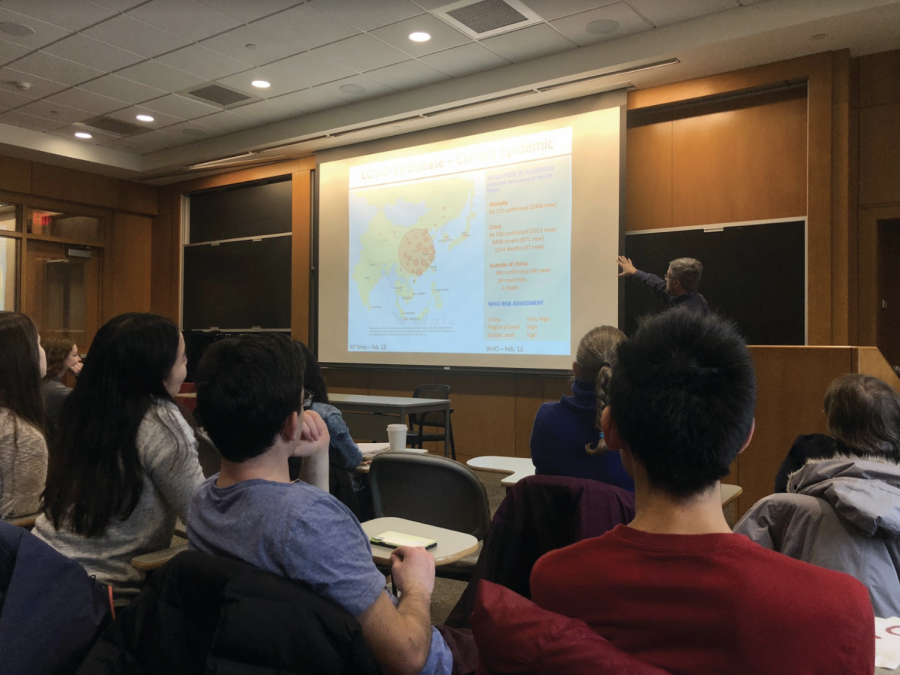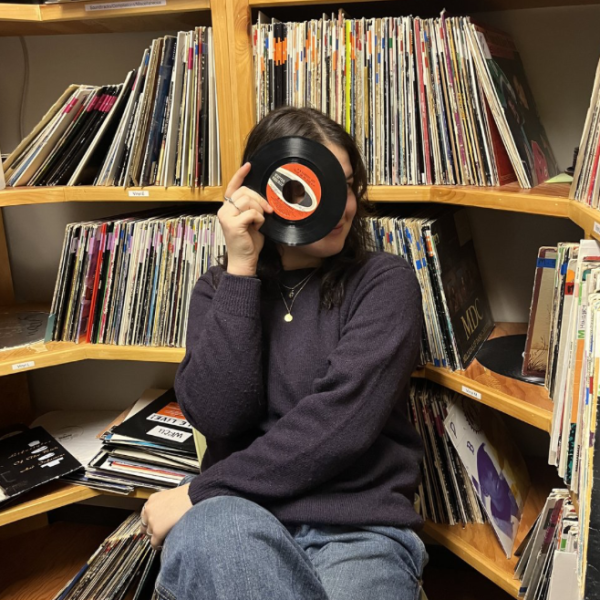Students Open Discourse on Coronavirus’ Impact
Due to the increased number of cases both in the United States and globally, Associate Professor of Biology Geoff Holm hosted a presentation and Q&A session on Thursday Feb. 13 on the medical science behind the 2019 Novel Coronavirus. Professor Holm’s research mostly focuses on mammalian reoviruses; reoviruses infect many mammals––humans included––but are seldom correlated to human disease.
During Professor Holm’s hour-long presentation, he echoed a consistent sentiment: the 2019 Novel Coronavirus’ perceived medical severity and its global scale have been disproportionate to the virus’ actual impact. Holm claimed that we are still in the early days of this epidemic and that contact rate, which varies depending on population density, plays a large factor in the development of the virus’ global severity.
“Take all this with a grain of salt. Yes, it [the 2019 Novel Coronavirus] is concerning, but there are bigger picture health issues that are more important. Influenza is still a bigger global health concern compared to the coronavirus,” Holm said.
One of the most challenging components in handling the virus has been preventing popular epithets from developing (i.e. when Israel’s deputy health minister declared the 2009 flu pandemic the “Mexican” flu), or allowing particular ethnic groups to be stigmatized due to the virus’ origin in Asia. The biology professor acknowledged that the virus’ title pertains to its symptoms in order to avoid this stigmatization of the condition.
Professor Holm acknowledged that there is virtually no threat in the Colgate campus being infected with the coronavirus, but that increasing sanitation and sterilization, as in when coughing promptly washing your hands, will only bolster these preventive measures.
After Professor Holm’s presentation, a luncheon for Colgate community members was hosted in Lawrence 105. Those in attendance shared their experiences in dealing with the coronavirus’ impact overseas as it has affected some students’ relatives and friends who reside in Asia. Students and faculty alike voiced their concerns with the rising levels of stigmatization both on the Colgate campus and in the greater world in general.
A topic that was mentioned numerous times during the lunch was Colgate’s improv comedy group Charred Goosebeak’s recent show titled, “The Heineken Virus.” The show’s title is a point of frustration for some. Posters for the comedy group’s recent show displayed its name but were not approved by the group’s CSLI Advisor Leigh-Ann Wenzel.
Sophomore Alex Tran, who is an intern at Colgate’s Office of International Student Services, served as a facilitator for the lunch’s discussion.
“Ever since the coronavirus became an international ‘sensation,’ I keep hearing how it is used as a tool to marginalize and stigmatize certain groups. I remembered perfectly how powerless I felt when these incidents happened. I hear heartbreaking stories and all I can give is my empathy. Regardless, I find comfort in the international community at Colgate. I believe we are here for each other, as we always will be. Although that communal power is powerful, I keep finding myself wondering if it is enough. The answer, most of the time, is no. However, I am grateful that my voice is heard in the slightest degree and I wish we would move forward together as a united community, the entire Colgate community,” Tran said.
Sophomore Xiying Feng was born and raised in Wuhan, China, where the coronavirus was initially discovered in December of 2019. Along with all of the other communities in Wuhan, Feng’s family has been forced to stay inside for the immediate future as the Chinese government continues their medical inspections in the city.
“Our campus is really a safe place as no one is infected and has the potential of being infected. However, since the disease is—in distance—far away from campus, some students make jokes about the disease and the infected people. This kind of behavior is very disrespectful and unethical. We are all humans that need to help humans in need. If we don’t help, at least, we should have the empathy for lives, but not make jokes about lives. A joke for you may be a life for other people’s friends, relatives, and families, so please be respectful at this sensitive and arduous moment,” Feng said.
First-year student Yiwen Xu is an international student studying abroad from her home country of China. Xu also attended the lunch discussion following Professor Holm’s presentation.
“I feel like this whole situation is foreign to me. Foreign in a way that I cannot do anything but to cope with it. And I believe that is exactly what everyone else here at Colgate is trying to do. However, there seems to be a disconnect among us when we are undergoing the same process of coping with the issue. Because I am exposed to the multiple news sources, I am able to empathize with others. I care about how my friends are feeling here at Colgate. On the other hand, I’m seeing people, who certainly have less exposure on the subject and are not interested in learning more, trying to make light of the subject. At this point, I think it’s pretty clear how some people’s way of coping can be seen as disrespectful and certainly disheartening here on campus,” Xu said.
Another facet of the Colgate community that has been impacted by the 2019 coronavirus has been students who are currently studying abroad in global regions where the virus has begun to spread.
Junior Spencer Spitz is spending the spring semester studying abroad in Australia but prior to that, he spent a week in Thailand. Spitz experienced layovers in South Korea, Japan, and Singapore, so he had spent a few days in those countries as well. According to Spitz, when he arrived in Japan and South Korea, every person in these airports was wearing an air-filtering masks and travellers’ body temperatures were constantly recorded before people could advance to the next travelling checkpoint. Spitz also observed quarantine centers in each airport he travelled through for citizens whose temperature was measured above the average body temperature.
Spitz and the friend he was travelling with packed bags filled with masks and hand sanitizer while they were moving throughout Asia. When Spitz was in Thailand, he had to carry around a bag of sanitary wipes when he walked around and was constantly washing his hands.
“It was kind of crazy because once you left the airport and got to the beaches, the Europeans and Americans that were there didn’t really seem to be wearing masks, but any people visiting from Asia or living in Thailand were all wearing these masks; all the workers and all their kids. Like, any moms with their babies would have these big masks for their babies as well. It didn’t impact me too much except for the fact that I had to wear a mask in the airport and just wash my hands more than often than I usually do. I’d say I was more precautious than scared or worried, but yeah, the virus was constantly talked about and seemed to be a concern for almost everyone while I have been traveling,” Spitz said.
The Colgate Office of Off-Campus study has also had to take some precautions with the University’s Japan study group in Kyoto. The Kyoto study group is a late-starting program, beginning on February 23. Japan’s overall status with the coronavirus has been quite minimal in the country aside from the Diamond Princess cruise ship that recently ended its quarantine, which is where the vast majority of the coronavirus is concentrated. This is why Japan is currently a hotspot for the virus’ activity.
Associate Professor of Geology and Associate Dean of the Faculty of Global and Local Initiatives Martin Wong acknowledged that Colgate will be taking preventive measures for these students who are going to be traveling on the Kyoto study group.
“There [the Kyoto study group] we have decided for that the first basically two weeks that they are on the ground to house them in individual hotel rooms instead of shared hotel rooms. And that is really out of an abundance of caution. The other thing that is unique about Japan is that they stay in homestays when they go to Kyoto. And the agency that works with the homestay group asked that we take some special precautions for the health and well-being of our students as some families expressed some concerns. And that seemed like a reasonable precaution to take given that they were going to be staying in homestays and that the agency that places them in these homestays requested that,” Wong said.
Associate Vice President for Campus Safety, Emergency Management and Environmental Health and Safety Dan Gough has been working with other faculty departments at Colgate to disseminate accurate information to community members who could potentially be impacted by the virus.
“Being informed on the status of the international public health issues associated with the virus is certainly my role and also working with our campus partners that also have roles in this,” Gough said.
Some of the measures Colgate’s Campus Safety and other departments have taken include: creating a Coronavirus FAQ Colgate webpage, collaborating with Senior Director of Communications and Parent Initiatives Rebecca Downing to communicate pertinent information to the Colgate parents’ Facebook group, and working with Director of Student Health Services Dr. Merrill Miller to send out a campus-wide to the Colgate community email on Jan. 28.
At the end of Professor Holm’s presentation, Assistant Dean and Director of International Student Services Kerra Hunter left those in attendance with a poignant message.
“I want you all to think of the scientific implications of things but also think about the person-to-person implications. There are students, community members who are directly impacted by what is going on who have to wonder if their parents will come to graduation. Wonder if they can go home. And it is having an effect on your fellow students. Students have been experiencing increasing incidents of xenophobia and isolation and bullying on this campus. And so I am challenging all of you in this space to do better––for sure. To encourage community members to do better. Support your fellow students,” Hunter said.
Nick Francoeur is a junior from Manhattan, New York studying philosophy at Colgate. He’s previously worked as a news writer and assistant news editor....











